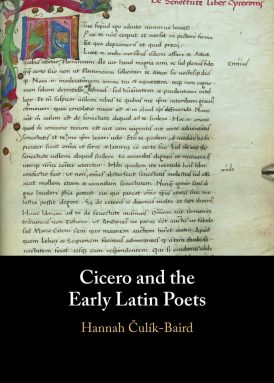Hannah Čulík-Baird

Originally from Glasgow, Scotland, I received my BA in Literae Humaniores from Oxford University in 2011 and my Ph.D. in Classics at the University of Southern California in 2017. Following five years with the Department of Classical Studies at Boston University, I joined the Classics Department at UCLA as an Associate Professor in 2022. My first book—Cicero and the Early Latin Poets (Cambridge University Press, 2022)—explores Cicero’s hundreds of quotations of Latin (and Greek) poets across his extensive corpus, studying the historical processes of fragmentation as well as demonstrating the complex intellectual practices which inform Cicero’s engagement with poetry as a historical, linguistic, philosophical, and ethical resource. I am deeply interested in the fragment as form—see my lectures: “Sympathy for Fragments?” (2023), “The Fragment and the Future” (2020)—as well as the processes of literary fragmentation, and have taught a graduate seminar on “fragmentological” problems at UCLA.
In addition to this first book, my broader research aims to address issues of epistemic and racial injustice in antiquity. In several articles, I have examined Cicero’s characterization of racially and socially marginalized figures in Rome. Since my arrival at UCLA, I have also entered into a collaborative research partnership with Mathias Hanses (Penn State) to co-write a monograph on representations and discourses of ancient race across the Ciceronian corpus as a whole. As a first step towards this co-authored book project, Mathias Hanses and I have written an article on Cicero’s racializing characterization of ancient Sardinians, former subjects of the Carthaginian empire whom Cicero denounces for their connections to Africa. This article—“Africa Ipsa Parens: Racializing Representations of Sardinians in Cicero’s Pro Scauro (54 BCE)”—will appear in the forthcoming special issue of TAPA (“Race and Racism: Beyond the Spectacular”) guest-edited by Sasha-Mae Eccleston (Brown University) and Patrice Rankine (University of Chicago). I teach an undergraduate course in translation on Race and Ethnicity in Antiquity at UCLA, and look forward to teaching an undergraduate Latin course on Roman Ethnography.
In addition to my research, since 2020 I have co-organized with Joseph Romero (University of Mary Washington) an annual online conference—Res Difficiles (resdifficiles.com)—addressing inequity in the field of Classics. The Res Difficiles conference series has for several years been a venue for discussing “difficulties” within the field of Classics, examining issues arising out of intersectional vectors of race, ethnicity, gender, sexuality, disability, class, socio-economic status and beyond. We have now also launched Res Difficiles, The Journal—an imprint of Ancient History Bulletin, a Green Open Access Journal—a peer-reviewed publication which invites submissions from individuals, pairs, or groups, addressing “difficult things” within the discipline of Classics and related fields: ancienthistorybulletin.org/res-difficiles-the-journal/.
Books
-

- Cicero and the Early Latin Poets
- Cambridge University Press, 2022
Articles and Book Chapters
2024, co-authored with Mathias Hanses, “Africa Ipsa Parens: Racializing Representations of Sardinians in Cicero’s Pro Scauro (54 BCE),” in S. Eccleston, P. Rankine (eds.) TAPA special issue, “Race and Racism: Beyond the Spectacular.”
2023, “The Image of the Slave in Cicero’s Catilinarians,” Rhetorica Vol. 41.4, 385-411.
2023, “Erasing the Aethiopian in Cicero’s Post Reditum in Senatu,” Ramus Vol. 52.2, 182-202.
2022, “The Portrait of the Actor in Cicero’s Pro Roscio Comoedo,” TAPA Vol. 152.1, 183-209.
2021, “Fragments of ‘anonymous’ Latin verse in Cicero,” in B. Kayachev (ed.), Poems without poets: approaches to anonymous ancient poetry (Cambridge Philological Society),105-119.
2020, “Archias the Good Immigrant,” Rhetorica, Vol. 38.4, 382-410.
2019, “Staging Roman Slavery in the Second Century BCE,” Ramus, Vol. 48.2, 174-197.
2018, “Stoicism in the Stars: Cicero’s Aratea in the De Natura Deorum,” Latomus, Vol. 77, 646-670.

